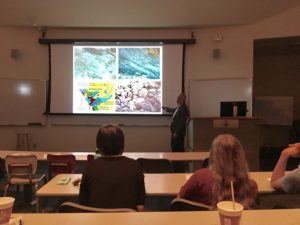
The hum from the projection screen retracting filled the lecture hall as 50 pairs of feet exited the presentation. After his 40-minute presentation over tectonic evolution, Richard Hanson, school of geology, energy and environment at Texas Christian University, finished off his water with a swig and began packing up his notes. “Hopefully they take something away from all this,” he thinks.
The Geoscience and Environmental Colloquium series kicked off Sept. 7, and as the first speaker, Hanson said he hopes people get interested in field geology and appreciate the science beyond capitalism.
“There is a lot of movement in this country to go against science and, without getting political, a lot of scientific advice is ignored. That’s a major problem,” Hanson said. “I am trying show that there is a wealth of information out there, and people working on these projects all the time. The kind of work we do, people sometimes say ‘Why should we pay you to do this? What good does it do?’ So I am always trying to emphasize here is a point to pure science.”
The Geoscience and Environmental Colloquium Series connects students to networking opportunities throughout the science community as well as engages students with the practical application for science.
According to Rebecca Dodge, associate professor of environmental science, President Trump’s plans for the Environmental Protection Agency policies as well as with the U.S. Geological Survey or the National Geographic and Ocean Administration have caused a lot of the experienced credible scientists to retire early, because they “don’t like the atmosphere,” she said, in addition to the orders to scale back various regulations.
“A lot of the environmental regulations are getting rolled back, and a lot of the stuff we are teaching is being attacked,” Dodge said. “People are saying scientists don’t know what they are talking about, so having these highly qualified people come on campus, we hope people will say ‘that makes sense, and I can believe that.'”
Two other lectures are scheduled for the fall semester, and Jesse Carlucci, associate professor of paleontology and sedimentology, said each lecture can vary between relating to the broader student audiences or a geoscience focused student, however he encourages students to talk with professors to see if the topic will apply to them.
“I try to do a mix every semester we have someone is really broad, accessible to everyone and someone who speaks very specific,” Carlucci said. “The student response really varies with our speakers, but this really gives the student the opportunity to expose themselves to topics they aren’t familiar with.”
According to Hanson, most geology students plan to go into oil and gas and read the the science reports for the geological framework to do what they do; however, Hanson said his focus lays with the excitement geology offers through the human desire to discover.
After living in Zambia, Africa for three years, Hanson said it “wasn’t because we are rocket scientists” that he found success, but instead through his willingness to enter into a relatively unexplored field to uncover something new instead of the same dusty routes.
“It’s a lot of living in tents, so it’s the kind of job if you love the outdoors,” he said. “If you don’t mind being uncomfortable and stuff, it can be a lot of fun.”
The last two lectures will be held on Oct. 12 and Nov. 9 in Bolin Room 100 at 5 p.m.















